Nursing Reflection Essay: Reflecting on Nursing Leadership Interview
VerifiedAdded on 2023/04/24
|10
|3505
|93
Essay
AI Summary
This essay presents a comprehensive reflection on an interview conducted with a senior midwife from Malaysia, focusing on leadership in mental health care settings. The student utilizes Gibb's reflective cycle to analyze the interview, covering description, feelings, evaluation, analysis, and action plan. The interview explored various aspects of nursing leadership, including leadership styles, conflict management, and crisis management strategies. The reflection highlights the importance of effective leadership for improving patient outcomes and creating positive work environments. The student discusses personal feelings, evaluations of the interview process, and the key learnings derived from the experience, supported by relevant literature and research. The analysis synthesizes the interview findings into practical insights regarding shared learning, safety culture, teamwork, conflict management, nurse fatigue, and nursing ethics. The essay concludes with a summary of key takeaways, areas for improvement, and the development of intellectual and practical skills gained from the interview, emphasizing the importance of reflective practice in nursing.
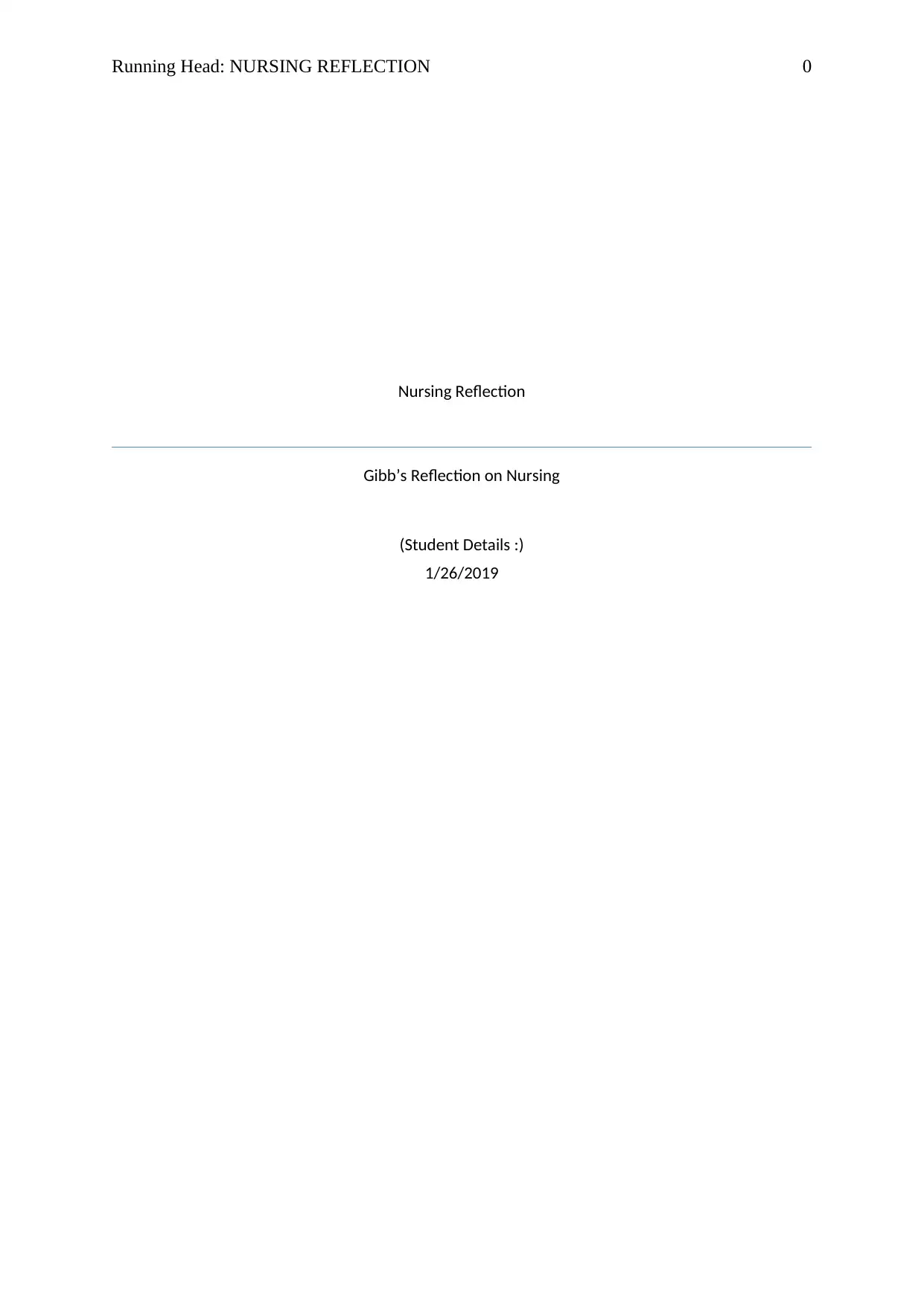
Running Head: NURSING REFLECTION 0
Nursing Reflection
Gibb’s Reflection on Nursing
(Student Details :)
1/26/2019
Nursing Reflection
Gibb’s Reflection on Nursing
(Student Details :)
1/26/2019
Paraphrase This Document
Need a fresh take? Get an instant paraphrase of this document with our AI Paraphraser
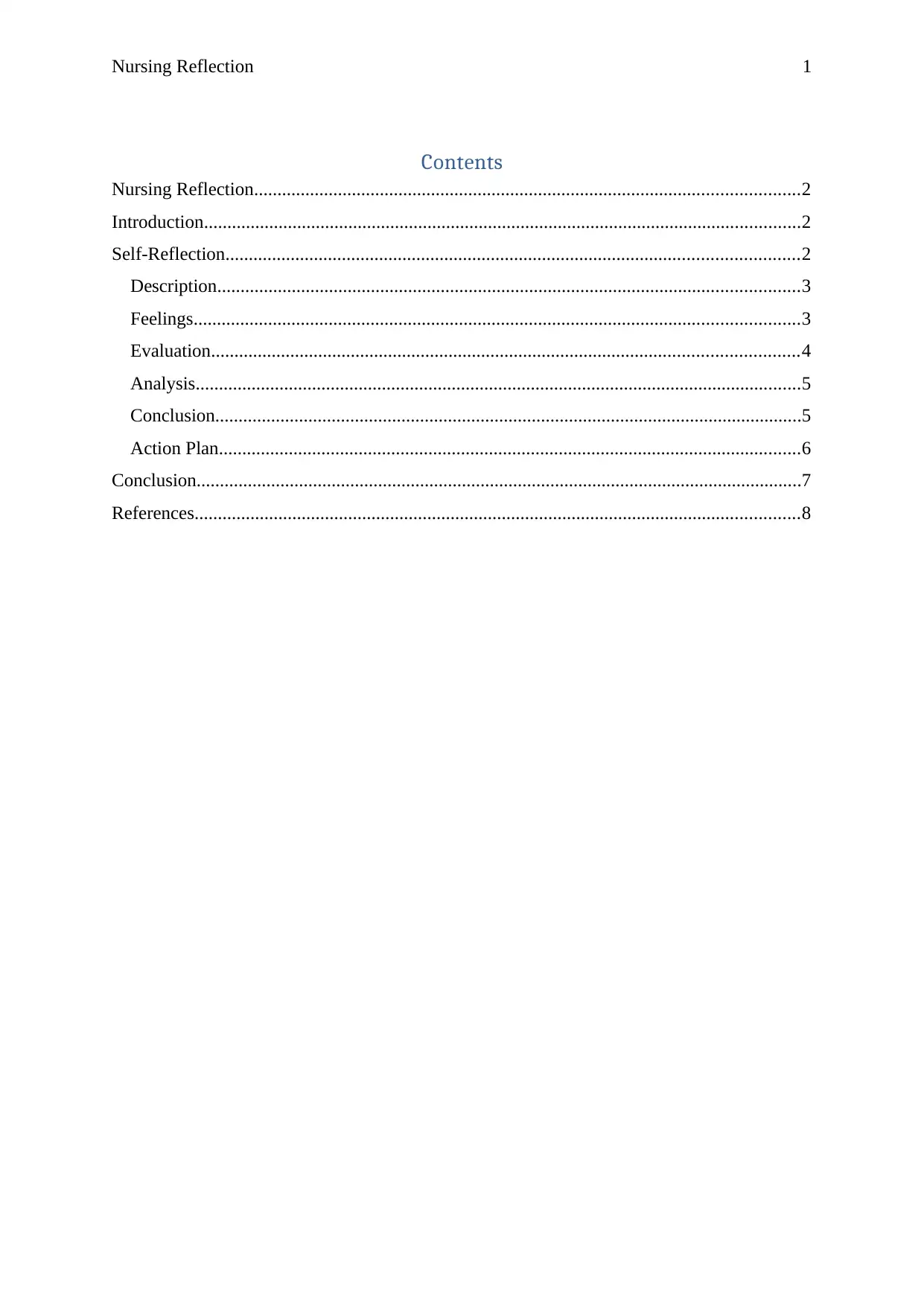
Nursing Reflection 1
Contents
Nursing Reflection.....................................................................................................................2
Introduction................................................................................................................................2
Self-Reflection...........................................................................................................................2
Description.............................................................................................................................3
Feelings..................................................................................................................................3
Evaluation..............................................................................................................................4
Analysis..................................................................................................................................5
Conclusion..............................................................................................................................5
Action Plan.............................................................................................................................6
Conclusion..................................................................................................................................7
References..................................................................................................................................8
Contents
Nursing Reflection.....................................................................................................................2
Introduction................................................................................................................................2
Self-Reflection...........................................................................................................................2
Description.............................................................................................................................3
Feelings..................................................................................................................................3
Evaluation..............................................................................................................................4
Analysis..................................................................................................................................5
Conclusion..............................................................................................................................5
Action Plan.............................................................................................................................6
Conclusion..................................................................................................................................7
References..................................................................................................................................8
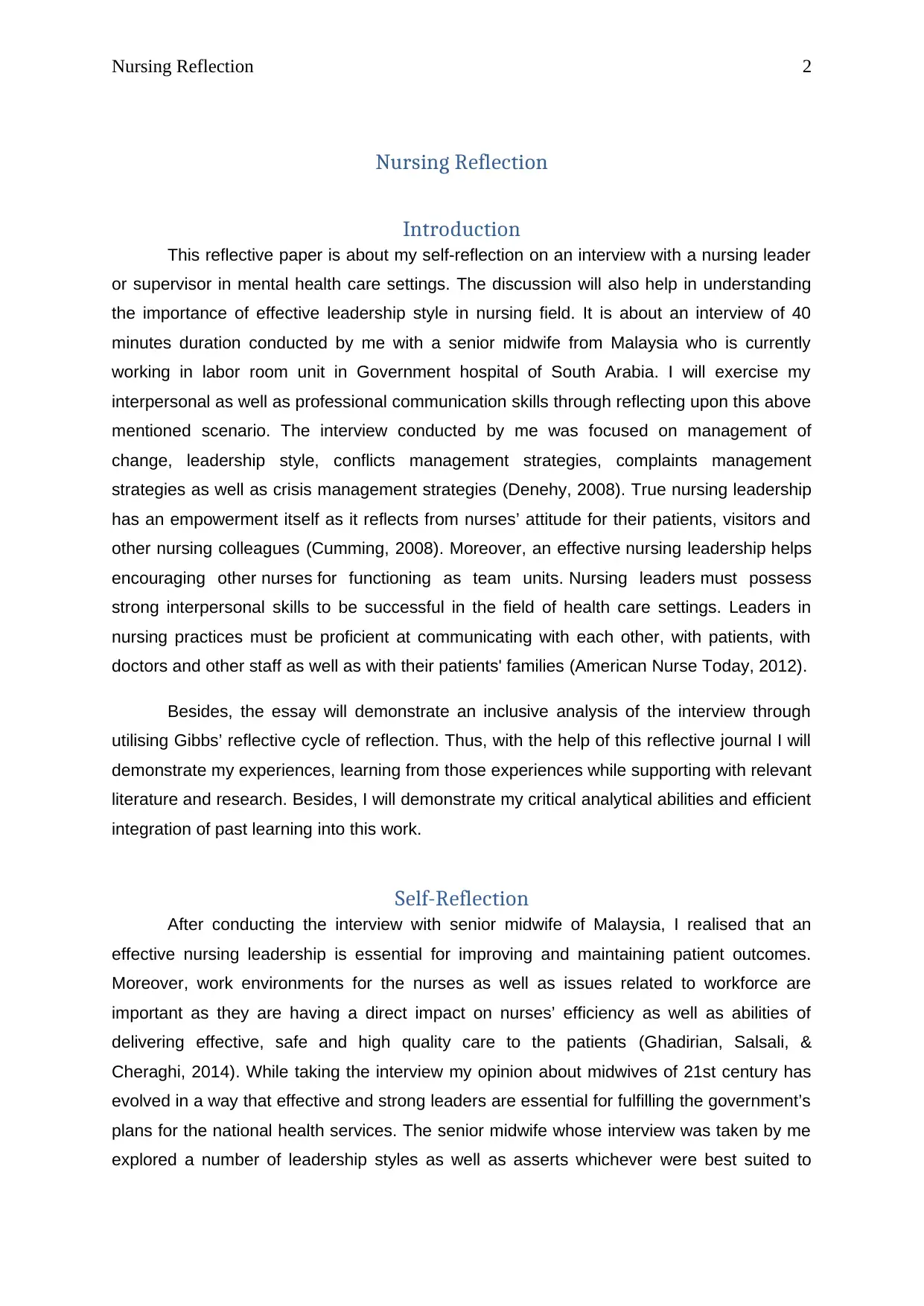
Nursing Reflection 2
Nursing Reflection
Introduction
This reflective paper is about my self-reflection on an interview with a nursing leader
or supervisor in mental health care settings. The discussion will also help in understanding
the importance of effective leadership style in nursing field. It is about an interview of 40
minutes duration conducted by me with a senior midwife from Malaysia who is currently
working in labor room unit in Government hospital of South Arabia. I will exercise my
interpersonal as well as professional communication skills through reflecting upon this above
mentioned scenario. The interview conducted by me was focused on management of
change, leadership style, conflicts management strategies, complaints management
strategies as well as crisis management strategies (Denehy, 2008). True nursing leadership
has an empowerment itself as it reflects from nurses’ attitude for their patients, visitors and
other nursing colleagues (Cumming, 2008). Moreover, an effective nursing leadership helps
encouraging other nurses for functioning as team units. Nursing leaders must possess
strong interpersonal skills to be successful in the field of health care settings. Leaders in
nursing practices must be proficient at communicating with each other, with patients, with
doctors and other staff as well as with their patients' families (American Nurse Today, 2012).
Besides, the essay will demonstrate an inclusive analysis of the interview through
utilising Gibbs’ reflective cycle of reflection. Thus, with the help of this reflective journal I will
demonstrate my experiences, learning from those experiences while supporting with relevant
literature and research. Besides, I will demonstrate my critical analytical abilities and efficient
integration of past learning into this work.
Self-Reflection
After conducting the interview with senior midwife of Malaysia, I realised that an
effective nursing leadership is essential for improving and maintaining patient outcomes.
Moreover, work environments for the nurses as well as issues related to workforce are
important as they are having a direct impact on nurses’ efficiency as well as abilities of
delivering effective, safe and high quality care to the patients (Ghadirian, Salsali, &
Cheraghi, 2014). While taking the interview my opinion about midwives of 21st century has
evolved in a way that effective and strong leaders are essential for fulfilling the government’s
plans for the national health services. The senior midwife whose interview was taken by me
explored a number of leadership styles as well as asserts whichever were best suited to
Nursing Reflection
Introduction
This reflective paper is about my self-reflection on an interview with a nursing leader
or supervisor in mental health care settings. The discussion will also help in understanding
the importance of effective leadership style in nursing field. It is about an interview of 40
minutes duration conducted by me with a senior midwife from Malaysia who is currently
working in labor room unit in Government hospital of South Arabia. I will exercise my
interpersonal as well as professional communication skills through reflecting upon this above
mentioned scenario. The interview conducted by me was focused on management of
change, leadership style, conflicts management strategies, complaints management
strategies as well as crisis management strategies (Denehy, 2008). True nursing leadership
has an empowerment itself as it reflects from nurses’ attitude for their patients, visitors and
other nursing colleagues (Cumming, 2008). Moreover, an effective nursing leadership helps
encouraging other nurses for functioning as team units. Nursing leaders must possess
strong interpersonal skills to be successful in the field of health care settings. Leaders in
nursing practices must be proficient at communicating with each other, with patients, with
doctors and other staff as well as with their patients' families (American Nurse Today, 2012).
Besides, the essay will demonstrate an inclusive analysis of the interview through
utilising Gibbs’ reflective cycle of reflection. Thus, with the help of this reflective journal I will
demonstrate my experiences, learning from those experiences while supporting with relevant
literature and research. Besides, I will demonstrate my critical analytical abilities and efficient
integration of past learning into this work.
Self-Reflection
After conducting the interview with senior midwife of Malaysia, I realised that an
effective nursing leadership is essential for improving and maintaining patient outcomes.
Moreover, work environments for the nurses as well as issues related to workforce are
important as they are having a direct impact on nurses’ efficiency as well as abilities of
delivering effective, safe and high quality care to the patients (Ghadirian, Salsali, &
Cheraghi, 2014). While taking the interview my opinion about midwives of 21st century has
evolved in a way that effective and strong leaders are essential for fulfilling the government’s
plans for the national health services. The senior midwife whose interview was taken by me
explored a number of leadership styles as well as asserts whichever were best suited to
⊘ This is a preview!⊘
Do you want full access?
Subscribe today to unlock all pages.

Trusted by 1+ million students worldwide
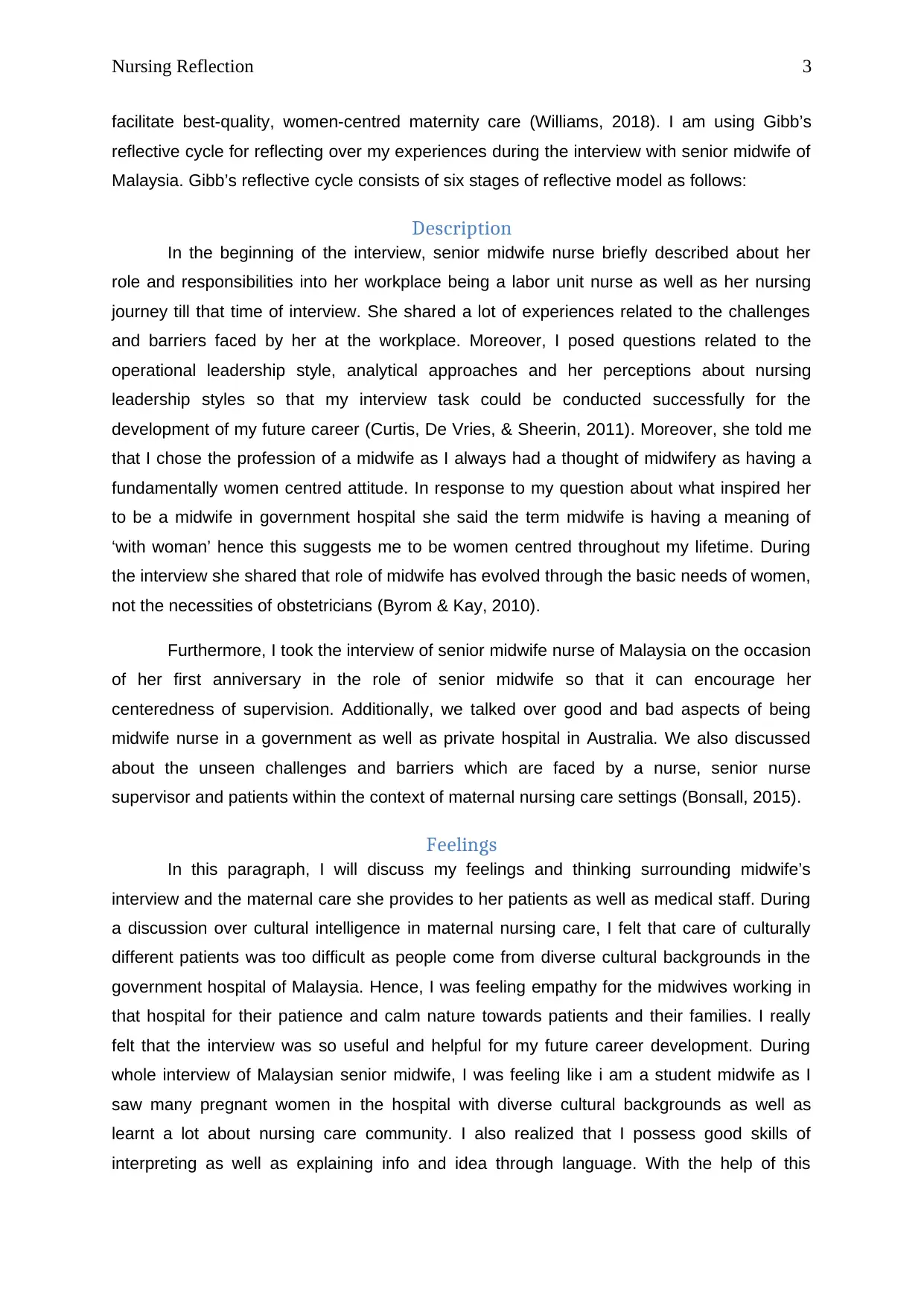
Nursing Reflection 3
facilitate best-quality, women-centred maternity care (Williams, 2018). I am using Gibb’s
reflective cycle for reflecting over my experiences during the interview with senior midwife of
Malaysia. Gibb’s reflective cycle consists of six stages of reflective model as follows:
Description
In the beginning of the interview, senior midwife nurse briefly described about her
role and responsibilities into her workplace being a labor unit nurse as well as her nursing
journey till that time of interview. She shared a lot of experiences related to the challenges
and barriers faced by her at the workplace. Moreover, I posed questions related to the
operational leadership style, analytical approaches and her perceptions about nursing
leadership styles so that my interview task could be conducted successfully for the
development of my future career (Curtis, De Vries, & Sheerin, 2011). Moreover, she told me
that I chose the profession of a midwife as I always had a thought of midwifery as having a
fundamentally women centred attitude. In response to my question about what inspired her
to be a midwife in government hospital she said the term midwife is having a meaning of
‘with woman’ hence this suggests me to be women centred throughout my lifetime. During
the interview she shared that role of midwife has evolved through the basic needs of women,
not the necessities of obstetricians (Byrom & Kay, 2010).
Furthermore, I took the interview of senior midwife nurse of Malaysia on the occasion
of her first anniversary in the role of senior midwife so that it can encourage her
centeredness of supervision. Additionally, we talked over good and bad aspects of being
midwife nurse in a government as well as private hospital in Australia. We also discussed
about the unseen challenges and barriers which are faced by a nurse, senior nurse
supervisor and patients within the context of maternal nursing care settings (Bonsall, 2015).
Feelings
In this paragraph, I will discuss my feelings and thinking surrounding midwife’s
interview and the maternal care she provides to her patients as well as medical staff. During
a discussion over cultural intelligence in maternal nursing care, I felt that care of culturally
different patients was too difficult as people come from diverse cultural backgrounds in the
government hospital of Malaysia. Hence, I was feeling empathy for the midwives working in
that hospital for their patience and calm nature towards patients and their families. I really
felt that the interview was so useful and helpful for my future career development. During
whole interview of Malaysian senior midwife, I was feeling like i am a student midwife as I
saw many pregnant women in the hospital with diverse cultural backgrounds as well as
learnt a lot about nursing care community. I also realized that I possess good skills of
interpreting as well as explaining info and idea through language. With the help of this
facilitate best-quality, women-centred maternity care (Williams, 2018). I am using Gibb’s
reflective cycle for reflecting over my experiences during the interview with senior midwife of
Malaysia. Gibb’s reflective cycle consists of six stages of reflective model as follows:
Description
In the beginning of the interview, senior midwife nurse briefly described about her
role and responsibilities into her workplace being a labor unit nurse as well as her nursing
journey till that time of interview. She shared a lot of experiences related to the challenges
and barriers faced by her at the workplace. Moreover, I posed questions related to the
operational leadership style, analytical approaches and her perceptions about nursing
leadership styles so that my interview task could be conducted successfully for the
development of my future career (Curtis, De Vries, & Sheerin, 2011). Moreover, she told me
that I chose the profession of a midwife as I always had a thought of midwifery as having a
fundamentally women centred attitude. In response to my question about what inspired her
to be a midwife in government hospital she said the term midwife is having a meaning of
‘with woman’ hence this suggests me to be women centred throughout my lifetime. During
the interview she shared that role of midwife has evolved through the basic needs of women,
not the necessities of obstetricians (Byrom & Kay, 2010).
Furthermore, I took the interview of senior midwife nurse of Malaysia on the occasion
of her first anniversary in the role of senior midwife so that it can encourage her
centeredness of supervision. Additionally, we talked over good and bad aspects of being
midwife nurse in a government as well as private hospital in Australia. We also discussed
about the unseen challenges and barriers which are faced by a nurse, senior nurse
supervisor and patients within the context of maternal nursing care settings (Bonsall, 2015).
Feelings
In this paragraph, I will discuss my feelings and thinking surrounding midwife’s
interview and the maternal care she provides to her patients as well as medical staff. During
a discussion over cultural intelligence in maternal nursing care, I felt that care of culturally
different patients was too difficult as people come from diverse cultural backgrounds in the
government hospital of Malaysia. Hence, I was feeling empathy for the midwives working in
that hospital for their patience and calm nature towards patients and their families. I really
felt that the interview was so useful and helpful for my future career development. During
whole interview of Malaysian senior midwife, I was feeling like i am a student midwife as I
saw many pregnant women in the hospital with diverse cultural backgrounds as well as
learnt a lot about nursing care community. I also realized that I possess good skills of
interpreting as well as explaining info and idea through language. With the help of this
Paraphrase This Document
Need a fresh take? Get an instant paraphrase of this document with our AI Paraphraser
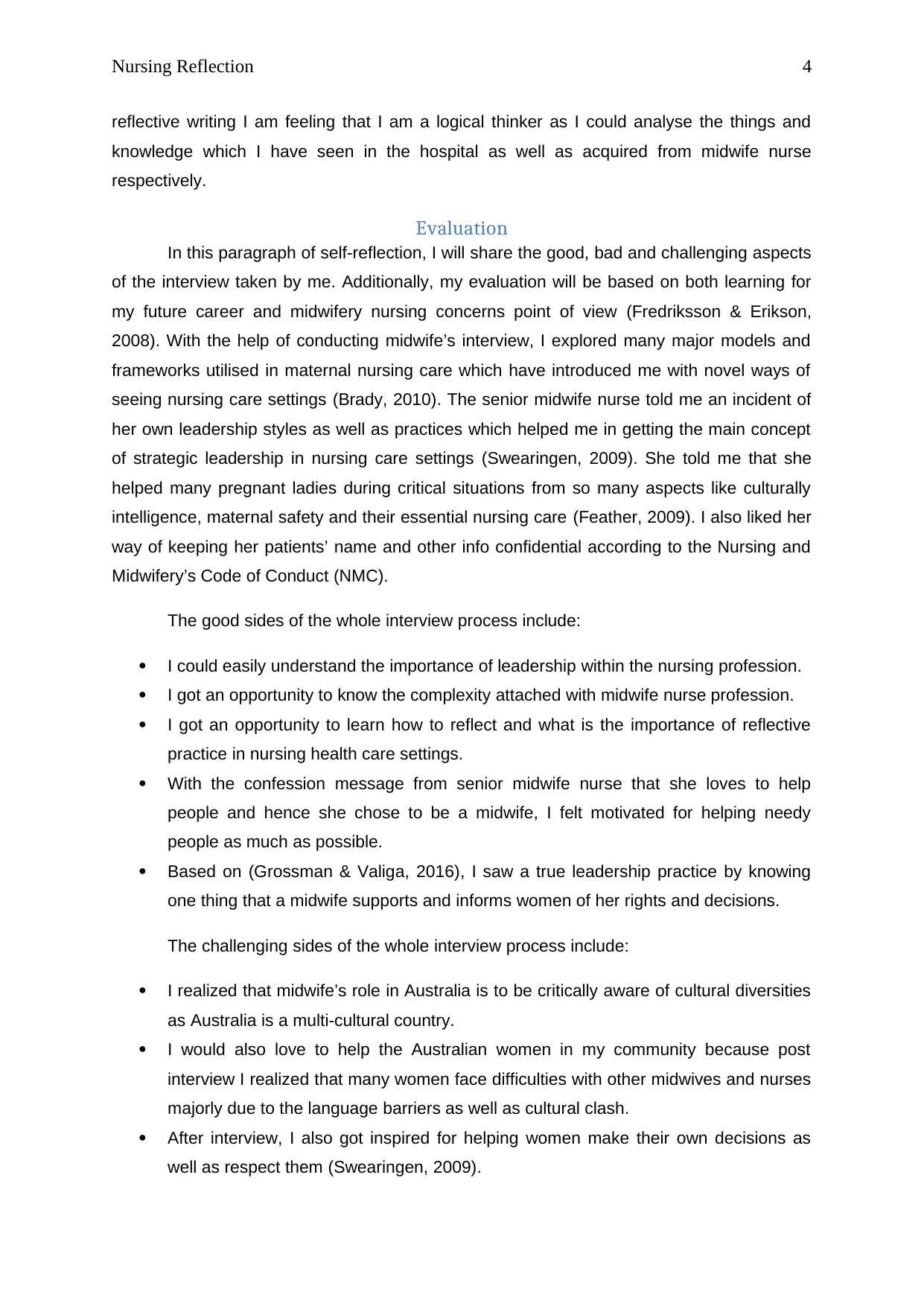
Nursing Reflection 4
reflective writing I am feeling that I am a logical thinker as I could analyse the things and
knowledge which I have seen in the hospital as well as acquired from midwife nurse
respectively.
Evaluation
In this paragraph of self-reflection, I will share the good, bad and challenging aspects
of the interview taken by me. Additionally, my evaluation will be based on both learning for
my future career and midwifery nursing concerns point of view (Fredriksson & Erikson,
2008). With the help of conducting midwife’s interview, I explored many major models and
frameworks utilised in maternal nursing care which have introduced me with novel ways of
seeing nursing care settings (Brady, 2010). The senior midwife nurse told me an incident of
her own leadership styles as well as practices which helped me in getting the main concept
of strategic leadership in nursing care settings (Swearingen, 2009). She told me that she
helped many pregnant ladies during critical situations from so many aspects like culturally
intelligence, maternal safety and their essential nursing care (Feather, 2009). I also liked her
way of keeping her patients’ name and other info confidential according to the Nursing and
Midwifery’s Code of Conduct (NMC).
The good sides of the whole interview process include:
I could easily understand the importance of leadership within the nursing profession.
I got an opportunity to know the complexity attached with midwife nurse profession.
I got an opportunity to learn how to reflect and what is the importance of reflective
practice in nursing health care settings.
With the confession message from senior midwife nurse that she loves to help
people and hence she chose to be a midwife, I felt motivated for helping needy
people as much as possible.
Based on (Grossman & Valiga, 2016), I saw a true leadership practice by knowing
one thing that a midwife supports and informs women of her rights and decisions.
The challenging sides of the whole interview process include:
I realized that midwife’s role in Australia is to be critically aware of cultural diversities
as Australia is a multi-cultural country.
I would also love to help the Australian women in my community because post
interview I realized that many women face difficulties with other midwives and nurses
majorly due to the language barriers as well as cultural clash.
After interview, I also got inspired for helping women make their own decisions as
well as respect them (Swearingen, 2009).
reflective writing I am feeling that I am a logical thinker as I could analyse the things and
knowledge which I have seen in the hospital as well as acquired from midwife nurse
respectively.
Evaluation
In this paragraph of self-reflection, I will share the good, bad and challenging aspects
of the interview taken by me. Additionally, my evaluation will be based on both learning for
my future career and midwifery nursing concerns point of view (Fredriksson & Erikson,
2008). With the help of conducting midwife’s interview, I explored many major models and
frameworks utilised in maternal nursing care which have introduced me with novel ways of
seeing nursing care settings (Brady, 2010). The senior midwife nurse told me an incident of
her own leadership styles as well as practices which helped me in getting the main concept
of strategic leadership in nursing care settings (Swearingen, 2009). She told me that she
helped many pregnant ladies during critical situations from so many aspects like culturally
intelligence, maternal safety and their essential nursing care (Feather, 2009). I also liked her
way of keeping her patients’ name and other info confidential according to the Nursing and
Midwifery’s Code of Conduct (NMC).
The good sides of the whole interview process include:
I could easily understand the importance of leadership within the nursing profession.
I got an opportunity to know the complexity attached with midwife nurse profession.
I got an opportunity to learn how to reflect and what is the importance of reflective
practice in nursing health care settings.
With the confession message from senior midwife nurse that she loves to help
people and hence she chose to be a midwife, I felt motivated for helping needy
people as much as possible.
Based on (Grossman & Valiga, 2016), I saw a true leadership practice by knowing
one thing that a midwife supports and informs women of her rights and decisions.
The challenging sides of the whole interview process include:
I realized that midwife’s role in Australia is to be critically aware of cultural diversities
as Australia is a multi-cultural country.
I would also love to help the Australian women in my community because post
interview I realized that many women face difficulties with other midwives and nurses
majorly due to the language barriers as well as cultural clash.
After interview, I also got inspired for helping women make their own decisions as
well as respect them (Swearingen, 2009).
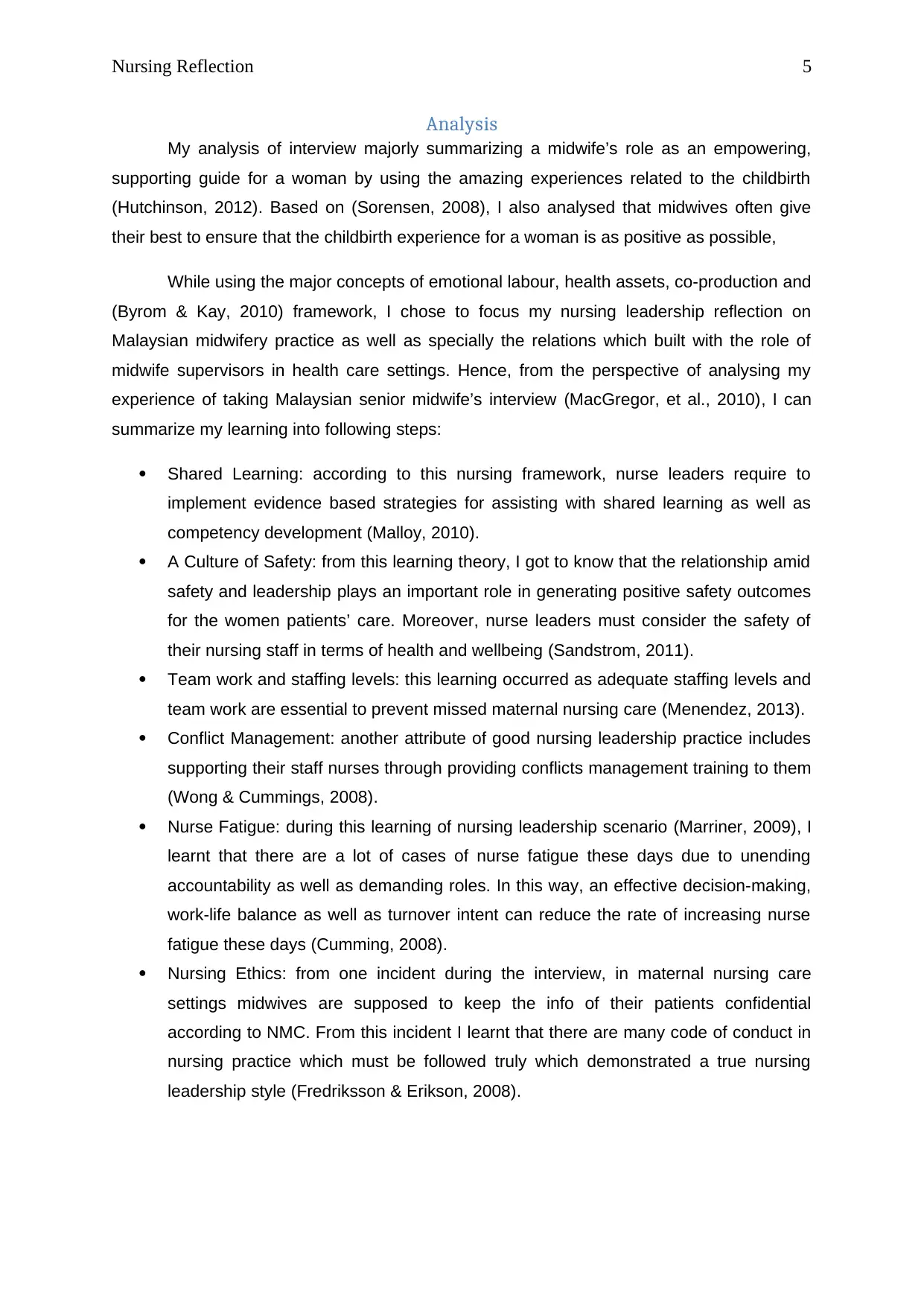
Nursing Reflection 5
Analysis
My analysis of interview majorly summarizing a midwife’s role as an empowering,
supporting guide for a woman by using the amazing experiences related to the childbirth
(Hutchinson, 2012). Based on (Sorensen, 2008), I also analysed that midwives often give
their best to ensure that the childbirth experience for a woman is as positive as possible,
While using the major concepts of emotional labour, health assets, co-production and
(Byrom & Kay, 2010) framework, I chose to focus my nursing leadership reflection on
Malaysian midwifery practice as well as specially the relations which built with the role of
midwife supervisors in health care settings. Hence, from the perspective of analysing my
experience of taking Malaysian senior midwife’s interview (MacGregor, et al., 2010), I can
summarize my learning into following steps:
Shared Learning: according to this nursing framework, nurse leaders require to
implement evidence based strategies for assisting with shared learning as well as
competency development (Malloy, 2010).
A Culture of Safety: from this learning theory, I got to know that the relationship amid
safety and leadership plays an important role in generating positive safety outcomes
for the women patients’ care. Moreover, nurse leaders must consider the safety of
their nursing staff in terms of health and wellbeing (Sandstrom, 2011).
Team work and staffing levels: this learning occurred as adequate staffing levels and
team work are essential to prevent missed maternal nursing care (Menendez, 2013).
Conflict Management: another attribute of good nursing leadership practice includes
supporting their staff nurses through providing conflicts management training to them
(Wong & Cummings, 2008).
Nurse Fatigue: during this learning of nursing leadership scenario (Marriner, 2009), I
learnt that there are a lot of cases of nurse fatigue these days due to unending
accountability as well as demanding roles. In this way, an effective decision-making,
work-life balance as well as turnover intent can reduce the rate of increasing nurse
fatigue these days (Cumming, 2008).
Nursing Ethics: from one incident during the interview, in maternal nursing care
settings midwives are supposed to keep the info of their patients confidential
according to NMC. From this incident I learnt that there are many code of conduct in
nursing practice which must be followed truly which demonstrated a true nursing
leadership style (Fredriksson & Erikson, 2008).
Analysis
My analysis of interview majorly summarizing a midwife’s role as an empowering,
supporting guide for a woman by using the amazing experiences related to the childbirth
(Hutchinson, 2012). Based on (Sorensen, 2008), I also analysed that midwives often give
their best to ensure that the childbirth experience for a woman is as positive as possible,
While using the major concepts of emotional labour, health assets, co-production and
(Byrom & Kay, 2010) framework, I chose to focus my nursing leadership reflection on
Malaysian midwifery practice as well as specially the relations which built with the role of
midwife supervisors in health care settings. Hence, from the perspective of analysing my
experience of taking Malaysian senior midwife’s interview (MacGregor, et al., 2010), I can
summarize my learning into following steps:
Shared Learning: according to this nursing framework, nurse leaders require to
implement evidence based strategies for assisting with shared learning as well as
competency development (Malloy, 2010).
A Culture of Safety: from this learning theory, I got to know that the relationship amid
safety and leadership plays an important role in generating positive safety outcomes
for the women patients’ care. Moreover, nurse leaders must consider the safety of
their nursing staff in terms of health and wellbeing (Sandstrom, 2011).
Team work and staffing levels: this learning occurred as adequate staffing levels and
team work are essential to prevent missed maternal nursing care (Menendez, 2013).
Conflict Management: another attribute of good nursing leadership practice includes
supporting their staff nurses through providing conflicts management training to them
(Wong & Cummings, 2008).
Nurse Fatigue: during this learning of nursing leadership scenario (Marriner, 2009), I
learnt that there are a lot of cases of nurse fatigue these days due to unending
accountability as well as demanding roles. In this way, an effective decision-making,
work-life balance as well as turnover intent can reduce the rate of increasing nurse
fatigue these days (Cumming, 2008).
Nursing Ethics: from one incident during the interview, in maternal nursing care
settings midwives are supposed to keep the info of their patients confidential
according to NMC. From this incident I learnt that there are many code of conduct in
nursing practice which must be followed truly which demonstrated a true nursing
leadership style (Fredriksson & Erikson, 2008).
⊘ This is a preview!⊘
Do you want full access?
Subscribe today to unlock all pages.

Trusted by 1+ million students worldwide
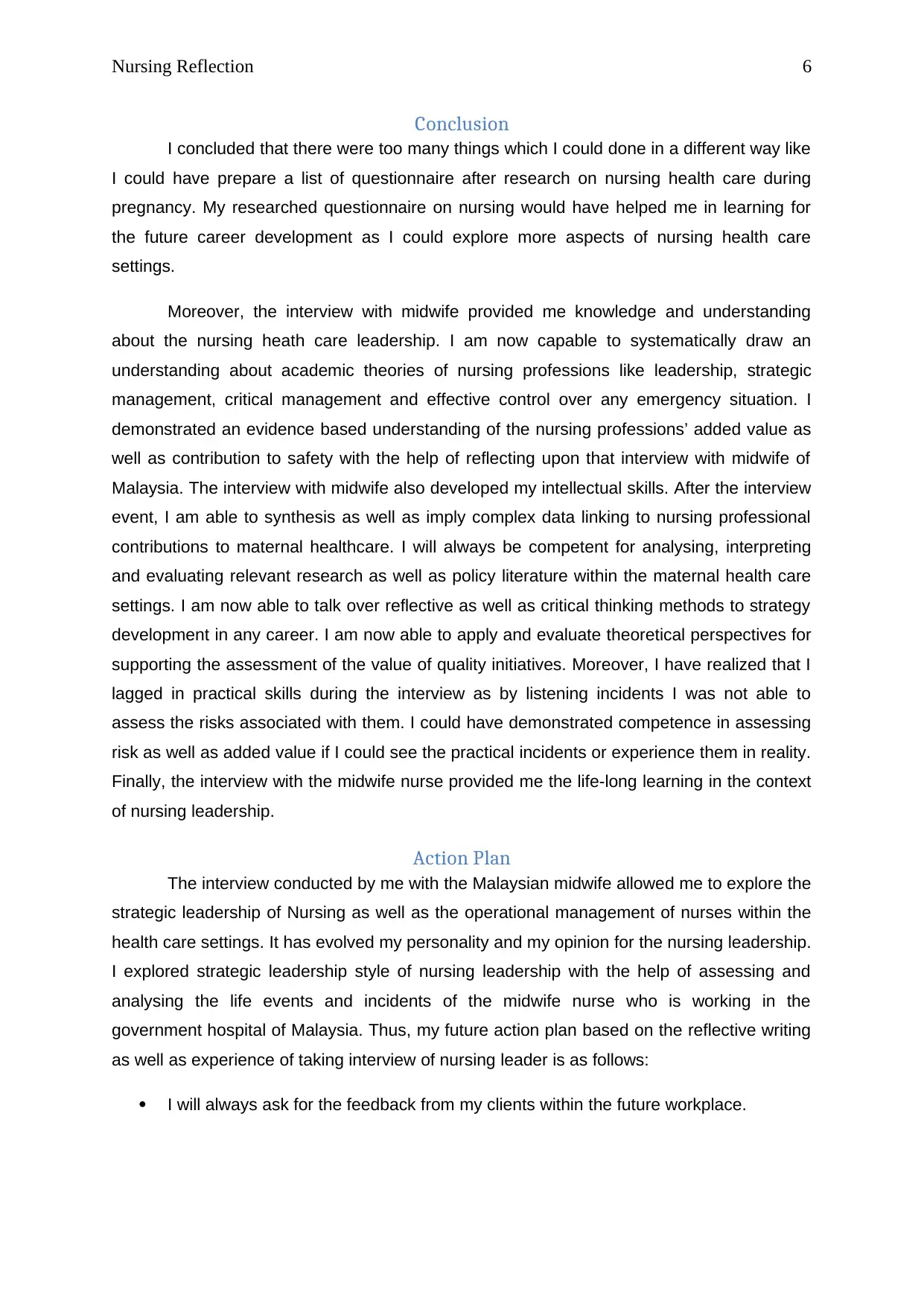
Nursing Reflection 6
Conclusion
I concluded that there were too many things which I could done in a different way like
I could have prepare a list of questionnaire after research on nursing health care during
pregnancy. My researched questionnaire on nursing would have helped me in learning for
the future career development as I could explore more aspects of nursing health care
settings.
Moreover, the interview with midwife provided me knowledge and understanding
about the nursing heath care leadership. I am now capable to systematically draw an
understanding about academic theories of nursing professions like leadership, strategic
management, critical management and effective control over any emergency situation. I
demonstrated an evidence based understanding of the nursing professions’ added value as
well as contribution to safety with the help of reflecting upon that interview with midwife of
Malaysia. The interview with midwife also developed my intellectual skills. After the interview
event, I am able to synthesis as well as imply complex data linking to nursing professional
contributions to maternal healthcare. I will always be competent for analysing, interpreting
and evaluating relevant research as well as policy literature within the maternal health care
settings. I am now able to talk over reflective as well as critical thinking methods to strategy
development in any career. I am now able to apply and evaluate theoretical perspectives for
supporting the assessment of the value of quality initiatives. Moreover, I have realized that I
lagged in practical skills during the interview as by listening incidents I was not able to
assess the risks associated with them. I could have demonstrated competence in assessing
risk as well as added value if I could see the practical incidents or experience them in reality.
Finally, the interview with the midwife nurse provided me the life-long learning in the context
of nursing leadership.
Action Plan
The interview conducted by me with the Malaysian midwife allowed me to explore the
strategic leadership of Nursing as well as the operational management of nurses within the
health care settings. It has evolved my personality and my opinion for the nursing leadership.
I explored strategic leadership style of nursing leadership with the help of assessing and
analysing the life events and incidents of the midwife nurse who is working in the
government hospital of Malaysia. Thus, my future action plan based on the reflective writing
as well as experience of taking interview of nursing leader is as follows:
I will always ask for the feedback from my clients within the future workplace.
Conclusion
I concluded that there were too many things which I could done in a different way like
I could have prepare a list of questionnaire after research on nursing health care during
pregnancy. My researched questionnaire on nursing would have helped me in learning for
the future career development as I could explore more aspects of nursing health care
settings.
Moreover, the interview with midwife provided me knowledge and understanding
about the nursing heath care leadership. I am now capable to systematically draw an
understanding about academic theories of nursing professions like leadership, strategic
management, critical management and effective control over any emergency situation. I
demonstrated an evidence based understanding of the nursing professions’ added value as
well as contribution to safety with the help of reflecting upon that interview with midwife of
Malaysia. The interview with midwife also developed my intellectual skills. After the interview
event, I am able to synthesis as well as imply complex data linking to nursing professional
contributions to maternal healthcare. I will always be competent for analysing, interpreting
and evaluating relevant research as well as policy literature within the maternal health care
settings. I am now able to talk over reflective as well as critical thinking methods to strategy
development in any career. I am now able to apply and evaluate theoretical perspectives for
supporting the assessment of the value of quality initiatives. Moreover, I have realized that I
lagged in practical skills during the interview as by listening incidents I was not able to
assess the risks associated with them. I could have demonstrated competence in assessing
risk as well as added value if I could see the practical incidents or experience them in reality.
Finally, the interview with the midwife nurse provided me the life-long learning in the context
of nursing leadership.
Action Plan
The interview conducted by me with the Malaysian midwife allowed me to explore the
strategic leadership of Nursing as well as the operational management of nurses within the
health care settings. It has evolved my personality and my opinion for the nursing leadership.
I explored strategic leadership style of nursing leadership with the help of assessing and
analysing the life events and incidents of the midwife nurse who is working in the
government hospital of Malaysia. Thus, my future action plan based on the reflective writing
as well as experience of taking interview of nursing leader is as follows:
I will always ask for the feedback from my clients within the future workplace.
Paraphrase This Document
Need a fresh take? Get an instant paraphrase of this document with our AI Paraphraser
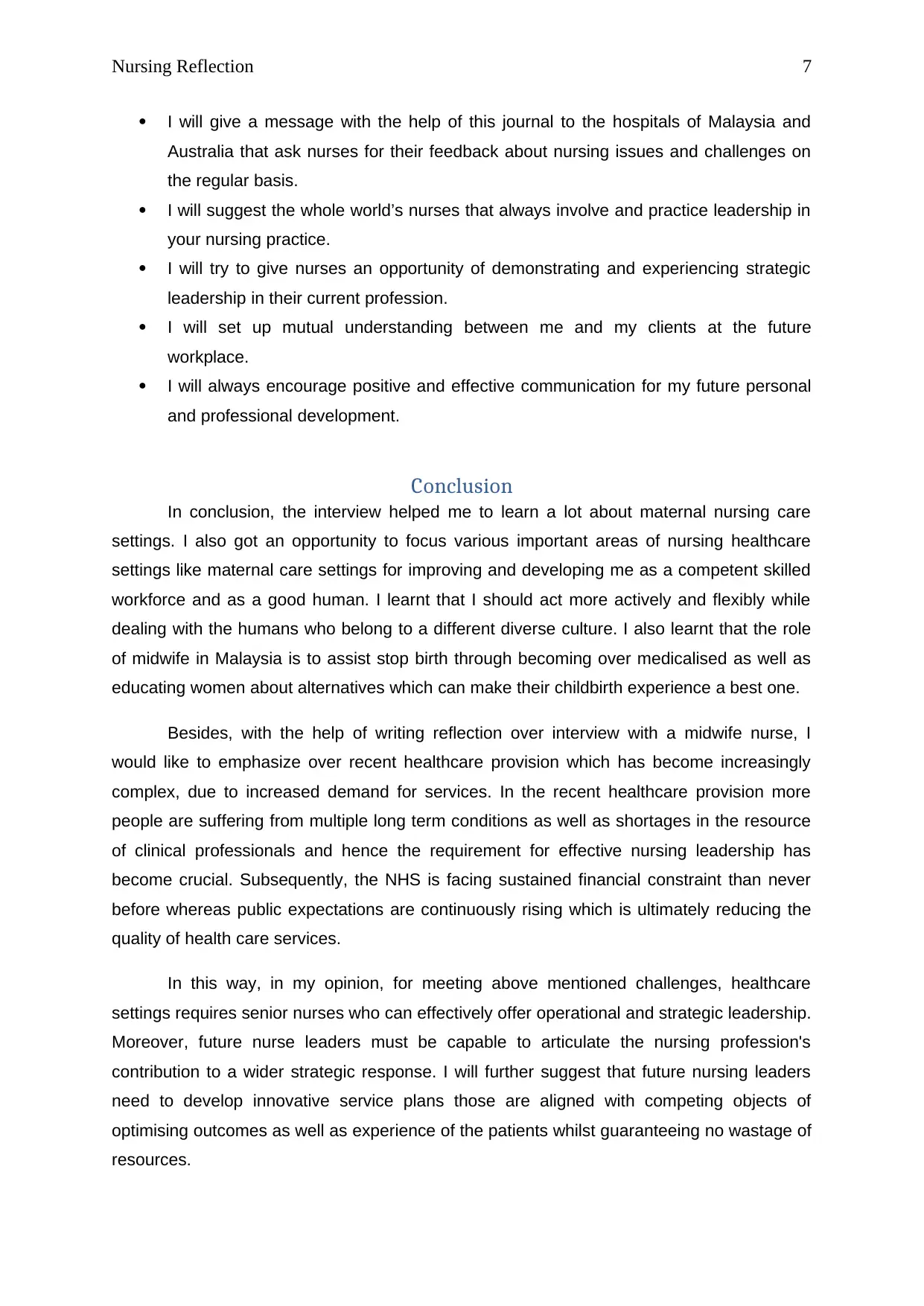
Nursing Reflection 7
I will give a message with the help of this journal to the hospitals of Malaysia and
Australia that ask nurses for their feedback about nursing issues and challenges on
the regular basis.
I will suggest the whole world’s nurses that always involve and practice leadership in
your nursing practice.
I will try to give nurses an opportunity of demonstrating and experiencing strategic
leadership in their current profession.
I will set up mutual understanding between me and my clients at the future
workplace.
I will always encourage positive and effective communication for my future personal
and professional development.
Conclusion
In conclusion, the interview helped me to learn a lot about maternal nursing care
settings. I also got an opportunity to focus various important areas of nursing healthcare
settings like maternal care settings for improving and developing me as a competent skilled
workforce and as a good human. I learnt that I should act more actively and flexibly while
dealing with the humans who belong to a different diverse culture. I also learnt that the role
of midwife in Malaysia is to assist stop birth through becoming over medicalised as well as
educating women about alternatives which can make their childbirth experience a best one.
Besides, with the help of writing reflection over interview with a midwife nurse, I
would like to emphasize over recent healthcare provision which has become increasingly
complex, due to increased demand for services. In the recent healthcare provision more
people are suffering from multiple long term conditions as well as shortages in the resource
of clinical professionals and hence the requirement for effective nursing leadership has
become crucial. Subsequently, the NHS is facing sustained financial constraint than never
before whereas public expectations are continuously rising which is ultimately reducing the
quality of health care services.
In this way, in my opinion, for meeting above mentioned challenges, healthcare
settings requires senior nurses who can effectively offer operational and strategic leadership.
Moreover, future nurse leaders must be capable to articulate the nursing profession's
contribution to a wider strategic response. I will further suggest that future nursing leaders
need to develop innovative service plans those are aligned with competing objects of
optimising outcomes as well as experience of the patients whilst guaranteeing no wastage of
resources.
I will give a message with the help of this journal to the hospitals of Malaysia and
Australia that ask nurses for their feedback about nursing issues and challenges on
the regular basis.
I will suggest the whole world’s nurses that always involve and practice leadership in
your nursing practice.
I will try to give nurses an opportunity of demonstrating and experiencing strategic
leadership in their current profession.
I will set up mutual understanding between me and my clients at the future
workplace.
I will always encourage positive and effective communication for my future personal
and professional development.
Conclusion
In conclusion, the interview helped me to learn a lot about maternal nursing care
settings. I also got an opportunity to focus various important areas of nursing healthcare
settings like maternal care settings for improving and developing me as a competent skilled
workforce and as a good human. I learnt that I should act more actively and flexibly while
dealing with the humans who belong to a different diverse culture. I also learnt that the role
of midwife in Malaysia is to assist stop birth through becoming over medicalised as well as
educating women about alternatives which can make their childbirth experience a best one.
Besides, with the help of writing reflection over interview with a midwife nurse, I
would like to emphasize over recent healthcare provision which has become increasingly
complex, due to increased demand for services. In the recent healthcare provision more
people are suffering from multiple long term conditions as well as shortages in the resource
of clinical professionals and hence the requirement for effective nursing leadership has
become crucial. Subsequently, the NHS is facing sustained financial constraint than never
before whereas public expectations are continuously rising which is ultimately reducing the
quality of health care services.
In this way, in my opinion, for meeting above mentioned challenges, healthcare
settings requires senior nurses who can effectively offer operational and strategic leadership.
Moreover, future nurse leaders must be capable to articulate the nursing profession's
contribution to a wider strategic response. I will further suggest that future nursing leaders
need to develop innovative service plans those are aligned with competing objects of
optimising outcomes as well as experience of the patients whilst guaranteeing no wastage of
resources.
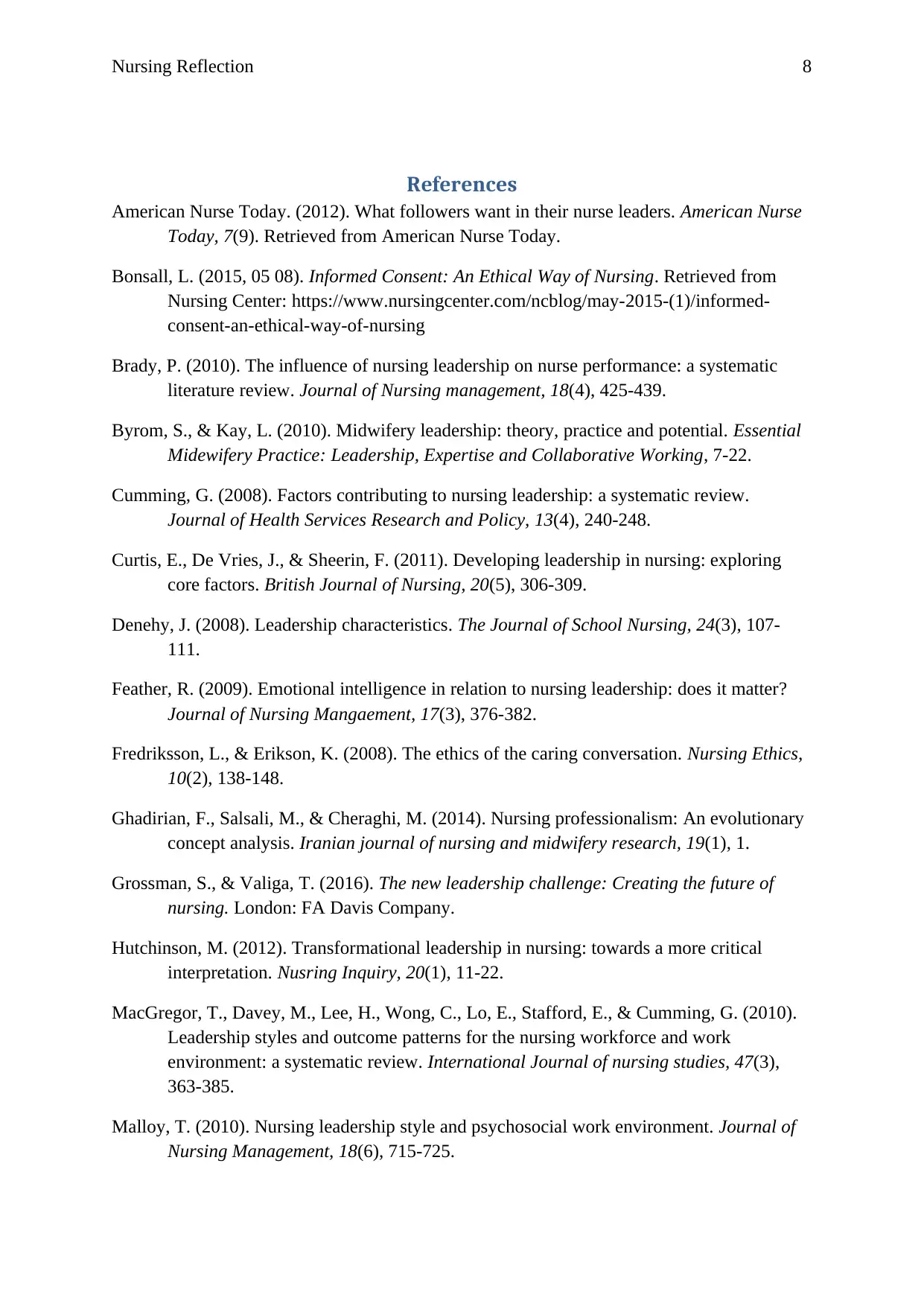
Nursing Reflection 8
References
American Nurse Today. (2012). What followers want in their nurse leaders. American Nurse
Today, 7(9). Retrieved from American Nurse Today.
Bonsall, L. (2015, 05 08). Informed Consent: An Ethical Way of Nursing. Retrieved from
Nursing Center: https://www.nursingcenter.com/ncblog/may-2015-(1)/informed-
consent-an-ethical-way-of-nursing
Brady, P. (2010). The influence of nursing leadership on nurse performance: a systematic
literature review. Journal of Nursing management, 18(4), 425-439.
Byrom, S., & Kay, L. (2010). Midwifery leadership: theory, practice and potential. Essential
Midewifery Practice: Leadership, Expertise and Collaborative Working, 7-22.
Cumming, G. (2008). Factors contributing to nursing leadership: a systematic review.
Journal of Health Services Research and Policy, 13(4), 240-248.
Curtis, E., De Vries, J., & Sheerin, F. (2011). Developing leadership in nursing: exploring
core factors. British Journal of Nursing, 20(5), 306-309.
Denehy, J. (2008). Leadership characteristics. The Journal of School Nursing, 24(3), 107-
111.
Feather, R. (2009). Emotional intelligence in relation to nursing leadership: does it matter?
Journal of Nursing Mangaement, 17(3), 376-382.
Fredriksson, L., & Erikson, K. (2008). The ethics of the caring conversation. Nursing Ethics,
10(2), 138-148.
Ghadirian, F., Salsali, M., & Cheraghi, M. (2014). Nursing professionalism: An evolutionary
concept analysis. Iranian journal of nursing and midwifery research, 19(1), 1.
Grossman, S., & Valiga, T. (2016). The new leadership challenge: Creating the future of
nursing. London: FA Davis Company.
Hutchinson, M. (2012). Transformational leadership in nursing: towards a more critical
interpretation. Nusring Inquiry, 20(1), 11-22.
MacGregor, T., Davey, M., Lee, H., Wong, C., Lo, E., Stafford, E., & Cumming, G. (2010).
Leadership styles and outcome patterns for the nursing workforce and work
environment: a systematic review. International Journal of nursing studies, 47(3),
363-385.
Malloy, T. (2010). Nursing leadership style and psychosocial work environment. Journal of
Nursing Management, 18(6), 715-725.
References
American Nurse Today. (2012). What followers want in their nurse leaders. American Nurse
Today, 7(9). Retrieved from American Nurse Today.
Bonsall, L. (2015, 05 08). Informed Consent: An Ethical Way of Nursing. Retrieved from
Nursing Center: https://www.nursingcenter.com/ncblog/may-2015-(1)/informed-
consent-an-ethical-way-of-nursing
Brady, P. (2010). The influence of nursing leadership on nurse performance: a systematic
literature review. Journal of Nursing management, 18(4), 425-439.
Byrom, S., & Kay, L. (2010). Midwifery leadership: theory, practice and potential. Essential
Midewifery Practice: Leadership, Expertise and Collaborative Working, 7-22.
Cumming, G. (2008). Factors contributing to nursing leadership: a systematic review.
Journal of Health Services Research and Policy, 13(4), 240-248.
Curtis, E., De Vries, J., & Sheerin, F. (2011). Developing leadership in nursing: exploring
core factors. British Journal of Nursing, 20(5), 306-309.
Denehy, J. (2008). Leadership characteristics. The Journal of School Nursing, 24(3), 107-
111.
Feather, R. (2009). Emotional intelligence in relation to nursing leadership: does it matter?
Journal of Nursing Mangaement, 17(3), 376-382.
Fredriksson, L., & Erikson, K. (2008). The ethics of the caring conversation. Nursing Ethics,
10(2), 138-148.
Ghadirian, F., Salsali, M., & Cheraghi, M. (2014). Nursing professionalism: An evolutionary
concept analysis. Iranian journal of nursing and midwifery research, 19(1), 1.
Grossman, S., & Valiga, T. (2016). The new leadership challenge: Creating the future of
nursing. London: FA Davis Company.
Hutchinson, M. (2012). Transformational leadership in nursing: towards a more critical
interpretation. Nusring Inquiry, 20(1), 11-22.
MacGregor, T., Davey, M., Lee, H., Wong, C., Lo, E., Stafford, E., & Cumming, G. (2010).
Leadership styles and outcome patterns for the nursing workforce and work
environment: a systematic review. International Journal of nursing studies, 47(3),
363-385.
Malloy, T. (2010). Nursing leadership style and psychosocial work environment. Journal of
Nursing Management, 18(6), 715-725.
⊘ This is a preview!⊘
Do you want full access?
Subscribe today to unlock all pages.

Trusted by 1+ million students worldwide
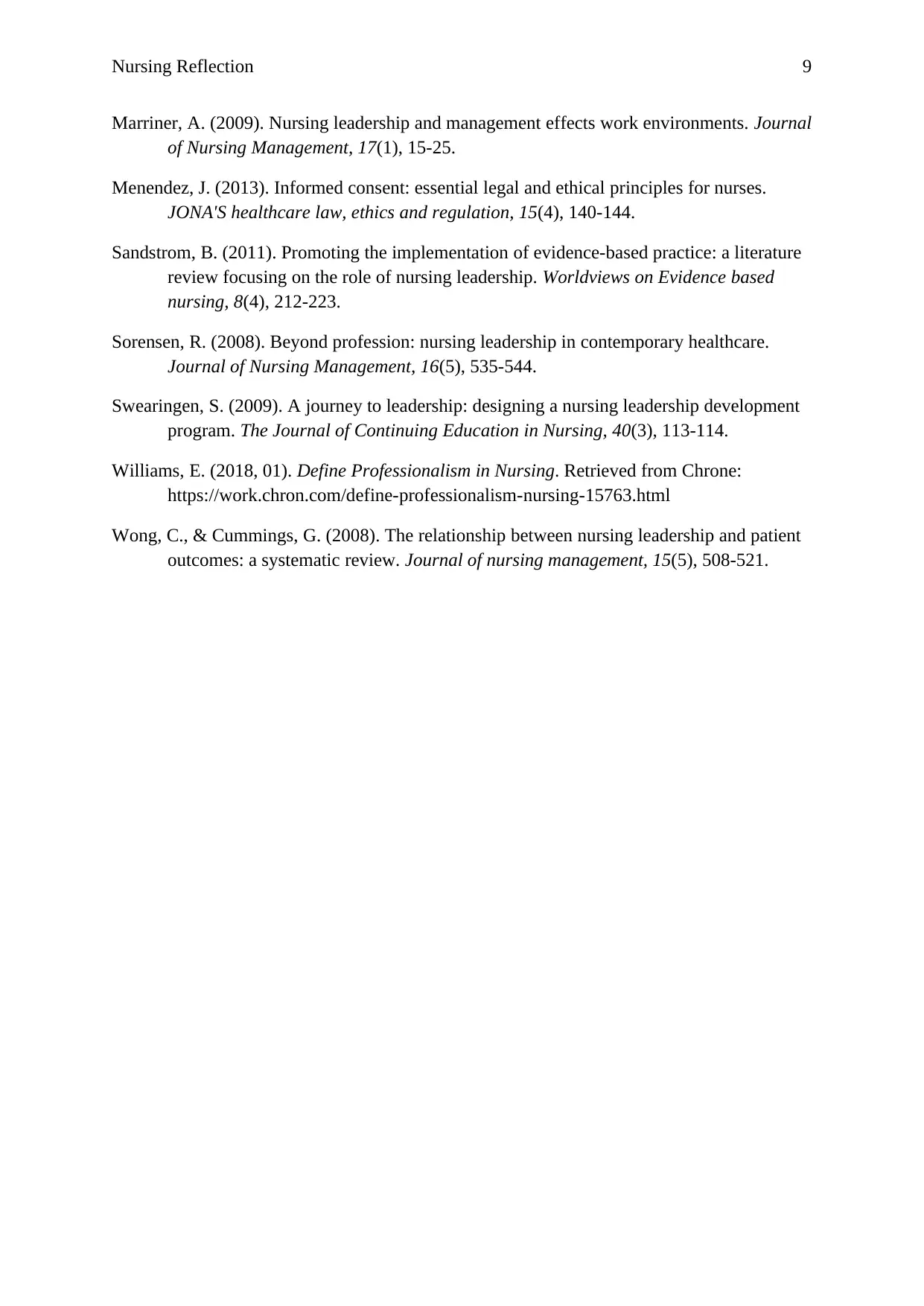
Nursing Reflection 9
Marriner, A. (2009). Nursing leadership and management effects work environments. Journal
of Nursing Management, 17(1), 15-25.
Menendez, J. (2013). Informed consent: essential legal and ethical principles for nurses.
JONA'S healthcare law, ethics and regulation, 15(4), 140-144.
Sandstrom, B. (2011). Promoting the implementation of evidence-based practice: a literature
review focusing on the role of nursing leadership. Worldviews on Evidence based
nursing, 8(4), 212-223.
Sorensen, R. (2008). Beyond profession: nursing leadership in contemporary healthcare.
Journal of Nursing Management, 16(5), 535-544.
Swearingen, S. (2009). A journey to leadership: designing a nursing leadership development
program. The Journal of Continuing Education in Nursing, 40(3), 113-114.
Williams, E. (2018, 01). Define Professionalism in Nursing. Retrieved from Chrone:
https://work.chron.com/define-professionalism-nursing-15763.html
Wong, C., & Cummings, G. (2008). The relationship between nursing leadership and patient
outcomes: a systematic review. Journal of nursing management, 15(5), 508-521.
Marriner, A. (2009). Nursing leadership and management effects work environments. Journal
of Nursing Management, 17(1), 15-25.
Menendez, J. (2013). Informed consent: essential legal and ethical principles for nurses.
JONA'S healthcare law, ethics and regulation, 15(4), 140-144.
Sandstrom, B. (2011). Promoting the implementation of evidence-based practice: a literature
review focusing on the role of nursing leadership. Worldviews on Evidence based
nursing, 8(4), 212-223.
Sorensen, R. (2008). Beyond profession: nursing leadership in contemporary healthcare.
Journal of Nursing Management, 16(5), 535-544.
Swearingen, S. (2009). A journey to leadership: designing a nursing leadership development
program. The Journal of Continuing Education in Nursing, 40(3), 113-114.
Williams, E. (2018, 01). Define Professionalism in Nursing. Retrieved from Chrone:
https://work.chron.com/define-professionalism-nursing-15763.html
Wong, C., & Cummings, G. (2008). The relationship between nursing leadership and patient
outcomes: a systematic review. Journal of nursing management, 15(5), 508-521.
1 out of 10
Related Documents
Your All-in-One AI-Powered Toolkit for Academic Success.
+13062052269
info@desklib.com
Available 24*7 on WhatsApp / Email
![[object Object]](/_next/static/media/star-bottom.7253800d.svg)
Unlock your academic potential
Copyright © 2020–2026 A2Z Services. All Rights Reserved. Developed and managed by ZUCOL.





